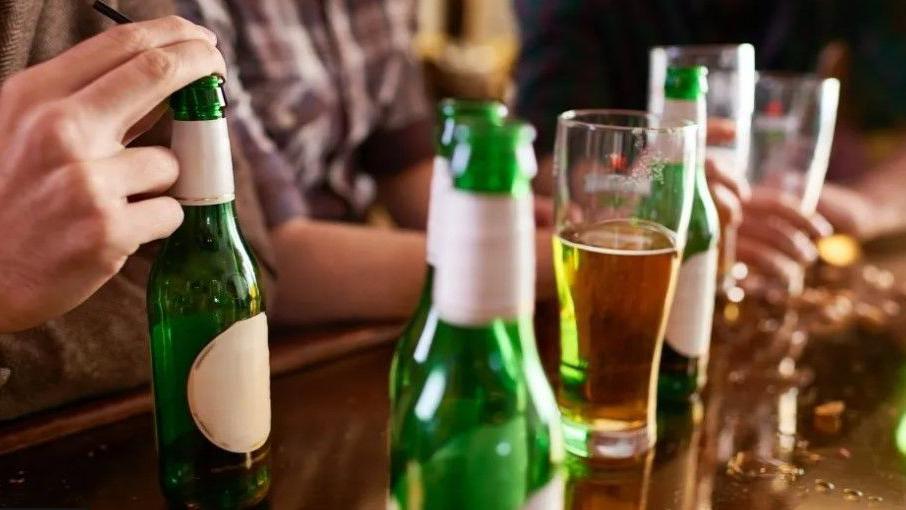'I hid my alcoholism for so many years'

Lisa Peacock has written a book called No Drink For Me about her relationship with alcohol
- Published
A recovering alcoholic says drinking is part of working-class culture, as a charity warns many people are consuming dangerous amounts.
Lisa Peacock, from Stockton, County Durham, started drinking when she was about 12 years old, leading to a "26-year toxic relationship" with alcohol, she said.
She has chronicled her journey to sobriety in a new book, No Drink For Me.
Alcohol awareness charity Fresh Balance has warned of the dangers of drinking excessive amounts of alcohol and said the issue was more prevalent in north-east England's most deprived communities.
Ms Peacock said she had tried to quit drinking once before but her final push came when she was lying in the bath and "imagined herself in a coffin".
Speaking to BBC Radio Tees, she said her drinking habit partly came from the culture around alcohol she experienced growing up.
"Where we are from, it's working class," she said.
"All the men would finish early on a Friday and go down the social clubs and everybody drank. As teenagers we are praised [for the amount we can drink]."
Long-term risks
Persistent alcohol misuse can increase the risk of developing a number of serious health conditions, according to the NHS, external.
These include heart disease, liver disease, pancreatitis and a number of cancers.
In the North East, the situation is particularly bad with many towns and cities suffering far higher rates of alcohol-related deaths.
The latest statistics from the Office for National Statistics, external (ONS) showed six of the top 20 areas with the highest rates of alcohol-related deaths from 2020 to 2022 were in the North East.
Sunderland had the second-highest rate of alcohol-related deaths in the country at 25.8 per 100,000 people, just behind Blackpool at 27.9.
South Tyneside was third (with 24.8 per 100,000), Middlesbrough fifth (23.8), North Tyneside 14th (21.8), Redcar and Cleveland 17th (21.4), and Newcastle was 20th (20.9).
Social 'glue'
Sue Taylor, from Fresh Balance, said sometimes people were made to feel "like alcohol is the glue which holds North East society together".
She said almost one million people in the region drank above the low risk guidelines of fourteen units per week.
"Despite this, the vast majority see themselves as 'light' or 'moderate' drinkers," she said.
"Clearly there is a huge information gap which has been fuelled by poor alcohol labelling and a lack of investment in national campaigns."
But Ms Taylor said there were signs the situation was improving and more people were becoming aware of the harm alcohol could cause.
She said data showed a reduction in drinking among young people and that more people were taking parts in "periods of abstinence".
No Drink For Me is being published on 21 September, during alcohol recovery month.
Ms Peacock said anyone worried about their relationship with alcohol should talk to someone as a first step.
"I hid my problem for so many years," she said.
"Even telling my partner of 10 years was so tough for me.
"There is help out there."
Follow BBC North East on X, external, Facebook, external, Nextdoor and Instagram, external. Send your story ideas to northeastandcumbria@bbc.co.uk.
Related topics
More stories from BBC North East and Cumbria
- Published11 June 2024

- Published2 April 2024
